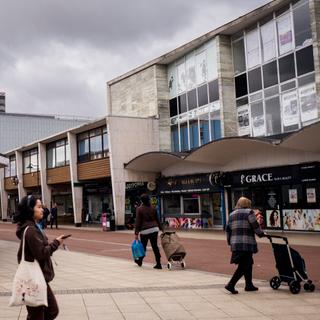


Basildon, a journey into the heart of the UK's stagnating economy
FeatureAs Rishi Sunak's government presents its budget on Wednesday, November 22, it faces a stagnant economy and an cost of living crisis.
For Tony Keane, the struggle to stay afloat began in the aftermath of the Covid-19 crisis. This self-employed driving instructor went from working five days a week to six, as he struggled to find enough students. Then, with the post-pandemic rebound, his clients returned, but he still had to stick to a six-day working week, "just to maintain the same standard of living." "Prices are skyrocketing. Everything's more expensive," said his wife, Angela. "Our eldest son recently left home. But our supermarket bill is still the same as before."
The couple finished their baked bean and fried egg lunch at a greasy spoon in Basildon, a small Essex town, just 40 minutes east of London by train. This typically English hearty eatery, complete with Formica tables, serves huge plates of French fries, curries and other English breakfasts for less than £10. On this November Friday, the restaurant was never empty, but all its customers agreed on one thing: Life seemed to be getting harder all the time.
At the real estate agency next door, Jade Bacon explained that she now had three jobs. A single mother of two teenagers, she juggles this full-time job with a side job carrying out inventories for rental apartments and a few hours working as a waitress on weekends. "My rent is really exorbitant," she said. She has been getting by, but life's little superfluous pleasures are gone. It's been two years since her last vacation. Meanwhile, the 20-year-old saleswoman at the pastry shop next door, who "got into a lot of mischief as a teenager," has taken to shopping with a calculator in hand, watching every penny.

Welcome to Basildon. This town of 190,000 inhabitants is neither particularly rich nor particularly poor. Based on an average of seven markers, The Economist magazine declared it "the most typical place in Britain." The median salary hovers around £31,000 (€35,400), slightly above the UK average (£29,670). This makes it a good place to gauge the health of the national economy, as Chancellor of the Exchequer Jeremy Hunt is due to deliver his Autumn Statement on Wednesday, November 22, a sort of mid-year report on the country's tax and spending plans, before the "real" national budget is presented in March.
The UK is stagnating economically. Gross domestic product in the third quarter was no higher than in the previous quarter, and growth over 2023 as a whole is expected to be 0.5%. "The economic situation is gloomy. I'd say there's a 50/50 chance we'll go into recession," said economist Michael Saunders, a former member of the Bank of England's Monetary Policy Committee. Soaring inflation – which peaked at 11.1% at the end of 2022 before falling back to 4.6% currently – and interest rate shock (as rates rose from 0.1% to 5.25%) have been hitting Britons' purchasing power hard.
You have 70% of this article left to read. The rest is for subscribers only.
